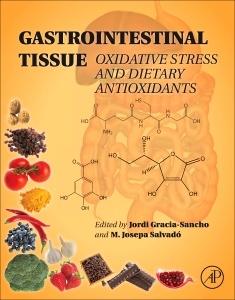Description
Gastrointestinal Tissue
Oxidative Stress and Dietary Antioxidants
Authors: Gracia-Sancho Jordi, Salvadó M. Josepa
Language: English
Subjects for Gastrointestinal Tissue:
Keywords
Allicin; Anthocyanins; Antiinflammatory; Antiinflammatory effect; Antioxidant; Antioxidant therapy; Antioxidant vitamins; Antioxidants; Berries; Beta-cell; Cancer; Cancer prevention; Catalase; Cell proliferation; Cells; Cholecystitis; Cholestasis; Cirrhosis; Colorectal cancer; Colorectal carcinoma; Crohn's disease; Diallyl disulfide; Diallyl sulfide; Diallyl trisulfide; Dietary intake; Disease; Ebselen; Fibrosis; Flavonoids; Free radical; Free radicals; GI diseases; GI disorders; GI protection; Gallbladder; Garlic; Gastric mucosa; Gastrointestinal; Gastrointestinal disease; Gastrointestinal diseases; Gastrointestinal disorders; Gastrointestinal protection; Gastrointestinal tract; Genomics; Ginger; Ginsenosides; Glutathione peroxidase; Gut barrier; Gut microbiota; H pylori; Hepatitis; Hepatocellular carcinoma; Herbs; Hypomagnesemia; Inflammation; Inflammatory bowel disease; Intestinal diseases; Irritable bowel syndrome; Ischemia-reperfusion; Lipoperoxidative events; Liposolubility; Liver; Liver disease; Liver diseases; Liver surgery; Lycopene; Magnesium; Marginal livers; Melatonin; Mental diseases; Metabolic syndrome; Metagenomics; Microbiota; Mitochondria biogenesis; Mitochondria-targeted antioxidant; Mitogen activated protein kinase; NAFLD; Necrotizing enterocolitis; Neurological diseases; Nitric oxide; Nonenzymatic antioxidant systems; Nuclear factor E2-related factor; Obesity; Oxidation; Oxidative stress; Pancreas; Pancreatic cancer; Pancreatitis; Pathophysiology; Peptic ulcers; Phagosome; Pharmacological treatments; Phytochemicals; Poly(ADP-ribose)polymerase-1; Polycytidylic acid; Polyphenols; Portal hypertension; Probiotics; Protection; Protein
182.55 €
In Print (Delivery period: 14 days).
Add to cartSupport: Print on demand
Description
/li>Contents
/li>Biography
/li>Comment
/li>
Gastrointestinal Tissue: Oxidative Stress and Dietary Antioxidants brings together leading experts from world renowned institutions, combining the basic mechanisms of gastrointestinal diseases with information regarding new and alternative treatments.
The processes within the science of oxidative stress are described in concert with other processes, including apoptosis, cell signaling and receptor mediated responses, further recognizing that diseases are often multifactorial with oxidative stress as a component. By combining the critical molecular processes underlying free radical mediated pathologies and the role of dietary antioxidant molecules, a connection is made that helps advance therapies and the prevention of gastrointestinal pathological processes.
This important reference is well designed with two complementary sections. Section One, Oxidative Stress and Gastroenterology, covers the basic processes of oxidative stress from molecular biology to whole organs, the gastrointestinal anatomy and sources of oxidative stress and free radicals and their products in gastrointestinal diseases. Section Two, Antioxidants and Gastroenterology covers antioxidants in foods, including plants and components.
Section 11. The Gastrointestinal system: anatomy and sources of oxidative stress2. Redox mechanisms of reactive oxygen species in gastrointestinal tract diseases3. Cancer in the gastrointestinal tract and oxidative stress4. Crohn’s disease and oxidative stress5. Mucosal injury and oxidative stress6. Helicobacter pylori and reactive oxygen species7. Inflammatory Bowel Diseases: The Crosslink Between Risk Factors and Antioxidant Therapy8. Gut microbiota and oxidative stress9. Liver diseases and oxidative stress10. Ischemia/reperfusion injury and oxidative stress11. Necrotizing enterocolitis and oxidative stress12. Pancreatitis, pancreatic cancer and oxidative stress13. Gallbladder disease – relevance of oxidative stress
Section 214. Molecular mechanism underlying the actions of antioxidant molecules15. Antioxidant vitamins, gastrointestinal protection and oxidative stress16. Role of oxidative stress in portal hypertension in cirrhosis17. Selenium, gastrointestinal protection and oxidative stress18. Berries: gastrointestinal protection against oxidative stress and inflammation19. Herbs, gastrointestinal protection and oxidative stress20. Garlic extract, gastrointestinal protection, oxidative stress, and inflammation21. Ginger extract (zingerone), gastrointestinal protection and oxidative stress22. Ginseng and gastrointestinal protection23. Kiwi fruit peptide kissper, gastrointestinal protection and oxidative stress24. Magnesium, gastrointestinal protection and oxidative stress25. Melatonin, gastrointestinal protection and oxidative stress26. Flavonoids for the treatment of gastrointestinal inflammation in obesity, role of oxidative stress27. Soy, gastrointestinal protection and oxidative stress 28. Lycopenes as antioxidants in gastrointestinal diseases
Jordi Gracia-Sancho is the Chief of the Liver Vascular Biology Research Group at the IDIBAPS Research Institute – Hospital Clínic de Barcelona, Associate Researcher at the Department of Visceral Surgery and Medicine – University of Bern, & Scientific Director of the Spanish Research Consortium on Liver & Digestive Diseases (CIBEREHD).
He graduated in Biochemistry receiving undergraduate research training in basic hemochromatosis at the London Metropolitan University, pursued pre-doctoral studies in basic portal hypertension at the University of Barcelona Medical School, and post-doctoral training at the Center for Excellence in Vascular Biology - Harvard Medical School & Brigham and Women’s Hospital. In 2012 he obtained the “Ramón y Cajal Spanish tenure-track position and then promoted to his current senior position.
Jordi’s research focuses on liver vascular pathobiology with special interest in the role of sinusoidal cells, and their interactions, in acute and chronic liver diseases, and in aging. He (co-)authored more than 125 peer-reviewed original papers and reviews, and currently serves as Associate Editor for the Journal of Hepatology. In addition, he is invited professor in different universities within Spain and Europe and co-leads diverse educational initiatives including the LiverSeminars Program (www.liverseminars.eu), the 2018 EASL-Basic School of Hepatology, the 2020 APASL-Symposium on Regression of Portal Hypertension, the 2020 AASLD-Symposium on Senescence and Liver Diseases, the 2021 EASL-Symposium on Sinusoidal Cells in Liver Diseases and the 2023 AMH-Irwin Arias Symposium.
Prof Gracia has been invited speaker in different national and international conferences, including the annual meetings of the European, American and Asia-Pacific associations of Hepatology. He has been member of the Scientific Committee of the Spanish Association for the Study of the Liver (AEEH) and the Steering Committee of the Portal Hypertension Spec
- Covers the science of oxidative stress in gastrointestinal tissue and associated conditions and scenarios
- Provides information on optimal levels for human consumption of antioxidants, suggested requirements per day, recommended dietary allowances and curative/preventive effects of dietary antioxidants
- Presents an easy to reference guide with two complementary sections that discuss the pathophysiology of gastrointestinal diseases in relation to oxidative stress and antioxidant therapies




